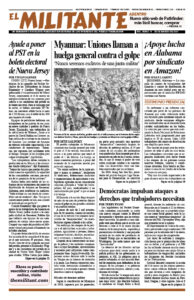Some 1,300 workers at nine Allegheny Technologies Inc. steel mills held a strike authorization vote March 5 with 95% backing a walkout. “It’s time to take a stand, and stop the bleeding,” Todd Barbiaux, a crane operator and president of United Steelworkers Local 1196 in Brackenridge, Pennsylvania, told the Militant by phone after the local’s over 400 members voted.
If a strike comes, he told the Pittsburgh Tribune-Review, “we’re prepared. We have the signs, the barrels, the sheds that can all be up within two hours.”
The overwhelming strike vote reflected workers’ rising anger and frustration with the steel bosses’ demands that seek to divide the workforce and weaken the union: a contract without a pay raise, deeper two-tier divisions, elimination of overtime after eight hours, cuts in health care and retirement, and increased contracting out. The Steelworkers have been working through a one-year contract extension, which expired Feb. 28.
“We haven’t had a raise in six years,” Ben McCain, a railroad engineer who moves molten slag and other steel waste byproducts in the Brackenridge mill, told the Militant. “We need higher wages because food and other costs are going up. The company wants us to work longer hours for less. They don’t care.”
The last time their union contract ran out in 2015, the company locked out the workers for seven months. The day after the lockout began, the bosses restarted production with strikebreakers brought in by the notorious scab-herding firm Strom Engineering. After the National Labor Relations Board ruled the lockout was illegal, a settlement was reached.
Workers went back into the plants with their heads held high, having won some of their demands, but they were also forced to accept a series of concessions, including the wage freeze.
At that time the union organized 2,200 workers at 12 plants. Today they represent 1,300. The bosses are shuttering union mills and shifting products and resources to nonunion plants in North Carolina.
“We are taking decisive action to become a more profitable company,” Robert Wetherbee, ATI president and CEO, told Berkshire Hathaway’s Business Wire last December, “by shedding a low-margin product line,” production of stainless steel, and “redeploying resources to an aerospace and defense-centered portfolio” to “generate significant value for our shareholders.” More union-organized plants are slated for closure.
“Here we are again, with a contract that forgets actual workers with real families,” Angie McCain told the Militant, referring to the 2015-16 lockout. “The lockout made people stick together in the plant.
“The spouses have started to talk with other spouses now,” she said. “If there’s a strike, we are here to fight.”
A former contract worker at ATI, McCain was active in Wives of Steel, which organized to get solidarity, food, funds and Christmas presents during the lockout.
Dave Varsho, a garage worker and unit chair of USW Local 7139-05 in Washington, Pennsylvania, was a probationary worker during the lockout who stuck with the union. “There are negotiations back and forth, but the items on the company side that separate union members, and create a two-tier situation, that’s the problem,” he said. “Solidarity is our strength.”
Messages of solidarity can be sent to: unionhall1196@gmail.com.

